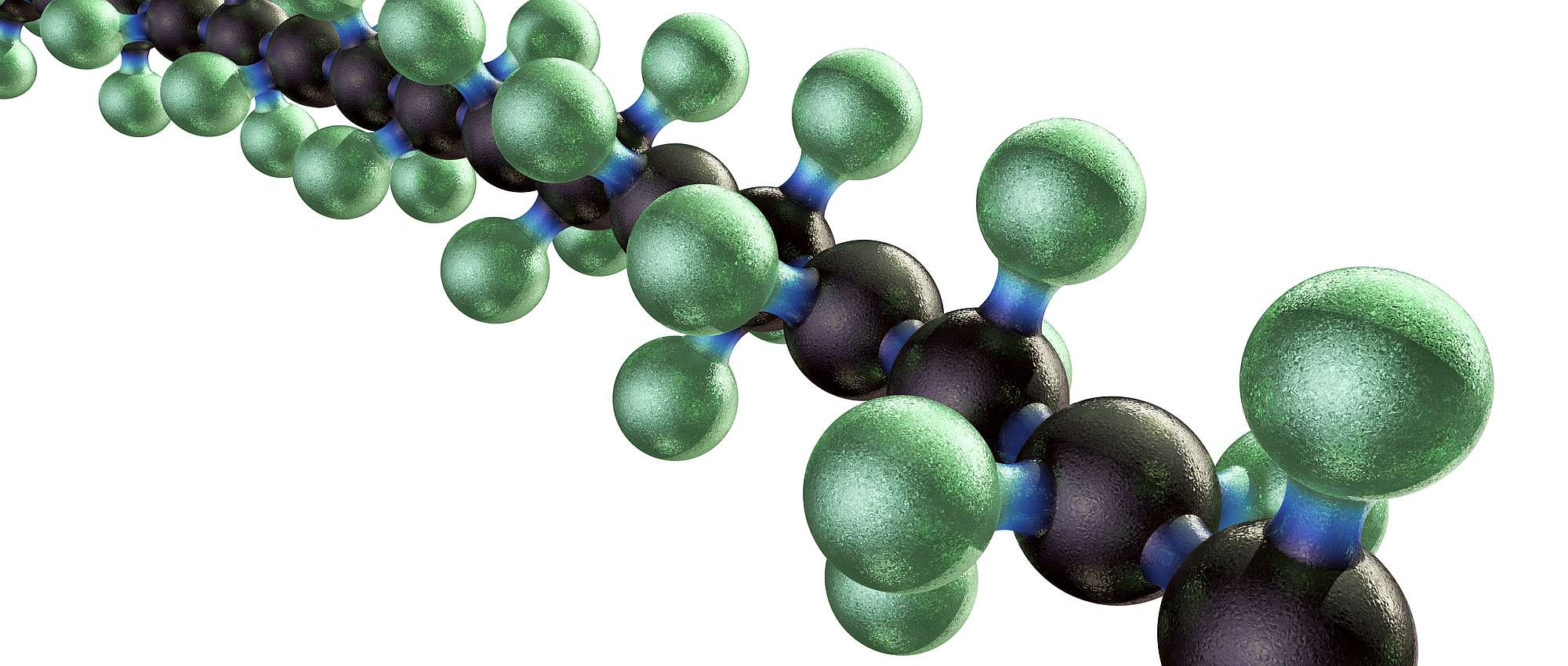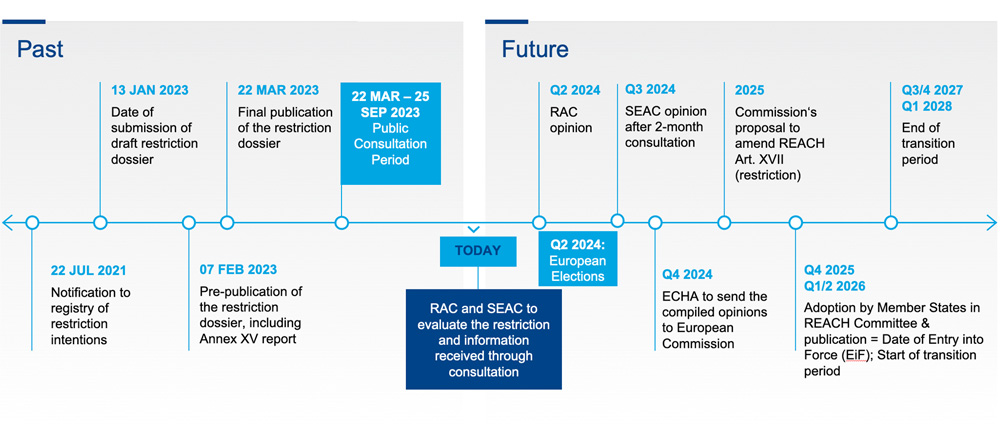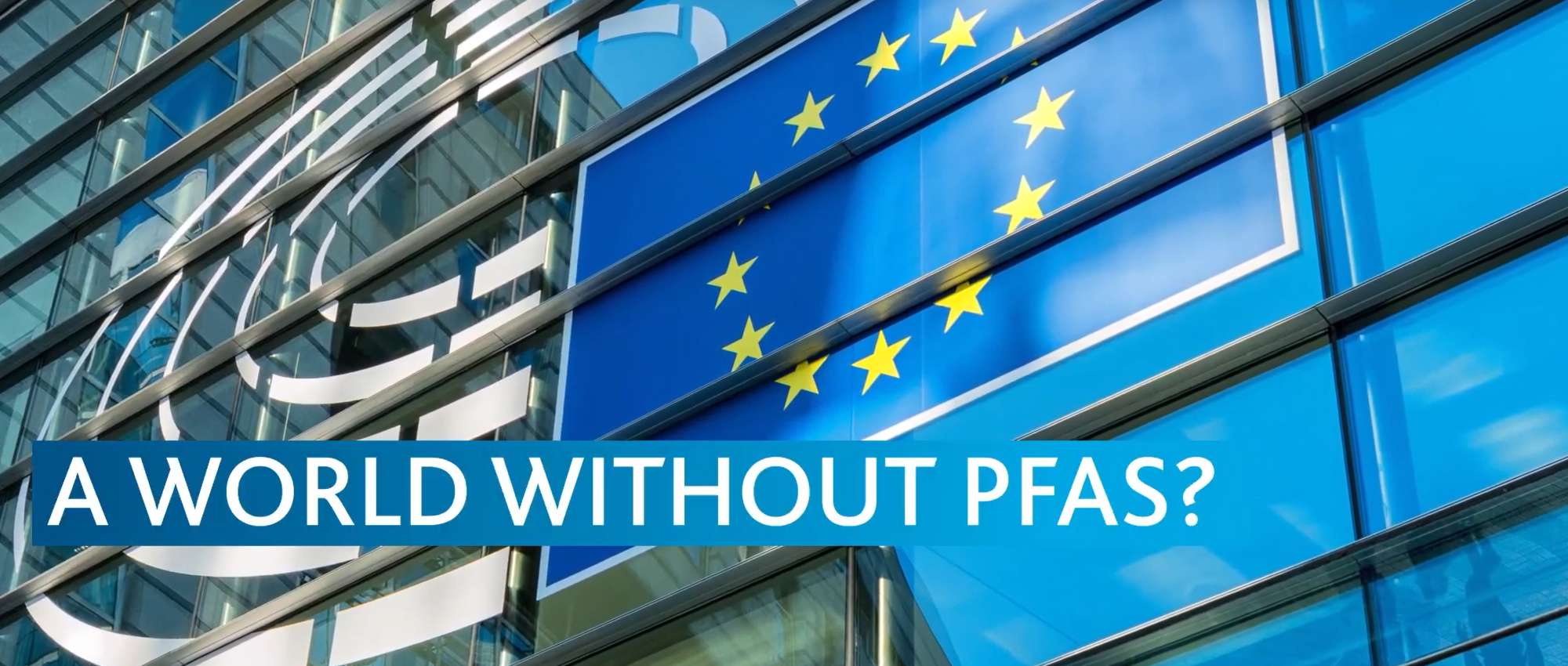
Statement on the European Chemicals Agency PFAS Restriction Proposal
In early February 2023, the European Chemicals Agency (ECHA) has published a proposal prepared by five EU member states to regulate the substance class of per- and polyfluoroalkyl substances (PFAS*), which is intended to largely restrict the placing on the market, manufacture, use and import of all PFAS.
On September 25th, 2023, the six-month public consultation period, where affected parties had the opportunity to provide further information to the ECHA on scientific and socio-economic factors, ended. More than 4,400 organizations, companies and individuals submitted more than 5,600 comments and information on the restriction proposal to the ECHA.
Freudenberg Sealing Technologies has also participated in the stakeholder consultation and actively engaged in relevant industry associations. We fully support the goals of the European Green Deal and the Chemicals Strategy for Sustainability to improve protection of human health and the environment from risks posed by chemicals and we advocate for a responsible, differentiated and risk-based approach to regulate PFAS. More details on our statement on the EU PFAS restriction proposal are available at https://echa.europa.eu/de/restrictions-under-consideration/-/substance-rev/72301/term
ECHA’s committees for Risk Assessment (RAC) and Socio-Economic Analysis (SEAC) will now evaluate the proposed restriction and consider the relevant information received through the consultation.
* PFAS definition: Any substance that contains at least one fully fluorinated methyl (CF3-) or methylene (-CF2-) carbon atom (without any H/Cl/Br/I attached to it).
PFAS REACH Restriction - Indicative Timeline
The following diagram shows the next steps in more detail:
We will continue to offer fluoropolymer-based materials like PTFE and FKM for the time being, given the fact that these fluoropolymers have exceptional resistance against temperature, corrosion, chemicals, and wear. Moreover, the characteristics of fluoropolymers allow a broad application range and robustness against unknown or varying fluids. We are committed to serve our customers’ needs and make use of these high-performing raw materials being embedded in our long-term supply strategy that includes not only external but also internal sources.
At the same time, we will continue to monitor the restriction proposal and legal requirements closely to be a reliable partner for our customers.
In addition, we will continue offering many other high-performance materials in our portfolio that do not contain fluoropolymers. Due to our long-term experience and expertise in material development and testing, we are continuously evaluating and developing application-based alternatives.
Besides the ongoing EU restriction proposal, are also closely monitoring recent developments and reporting obligations outside of Europe. We will comply with applicable requirements and align with affected customers as soon as specific reporting obligations will become effective.
Click here to find our statement to the ECHA on the planned restriction proposal
Below you can find a Q&A further explaining the current situation.
Q&A
No, polymeric substances are clearly toxicologically harmless. Our PTFE and FKM materials for applications in the pharmaceutical and food & beverage industries have been intensively tested and comply with all legal requirements.
It is impossible to make a general statement about the toxicity of PFAS, as this broad group contains 10,000 of different substances. Fluoropolymers like FKM or PTFE are defined by OECD as ‘polymers of low concern’ which have insignificant environmental and human health impacts.
In its 2020 chemicals strategy for sustainability, the European Union (EU) formulated a zero-pollutant target that aims to better protect citizens and the environment from harmful chemicals.
In mid-February 2023, the European Chemicals Agency ECHA published a proposal prepared by five EU member states to regulate the substance class of per- and polyfluoroalkyl substances (PFAS), which is intended to largely restrict the placing on the market, manufacture, use and import of PFAS.
The approximately 10,000 per- and polyfluorinated alkyl compounds (PFAS) affected by the forthcoming EU regulation can be divided into two groups: the low molecular weight per- and polyfluoroalkyl substances (small molecules) and the polymers (large molecules).
Polymers include, for example, thermoplastics such as PTFE, PVDF, FEP and rubbers FKM, FFKM and FVMQ. Freudenberg Sealing Technologies does not manufacture these itself but we use them - mainly PTFE and FKM - as base materials for some of our sealing materials.
The materials in question, such as PTFE and FKM, are high-performance materials: they have a long lifetime and a high temperature resistance; they are resistant to aggressive media and resistant to wear.
In very few cases will there be a 1:1 replacement with other suitable materials that meet these requirements. Reductions in e.g. the service life are to be expected.
At this point in time, we are evaluating affected parts based on the information available in the restriction proposal. Freudenberg Sealing Technologies will inform customers in due course on the affected part numbers once identified. In addition, please note that affected part numbers may change depending on the wording of the final EU Commission's proposal to amend REACH Art. XVII.
The current restriction proposal does not evaluate on the PFAS concentration. Parts containing any concentration would be affected, which is why Freudenberg Sealing Technologies does not focus on assessing the concrete PFAS concentration of affected parts at the moment.
Although the evaluation of the restriction proposal is currently ongoing, Freudenberg Sealing Technologies has started to review alternative materials as part of its risk mitigation efforts. We will specifically inform our customers as soon as more detailed information becomes available in this context and coordinate the individual options with each customer individually.
Proposition 65 targets chemicals known to cause cancer, birth defects or other reproductive harm, and is intended to protect California's drinking water sources from contamination. The current Proposition 65 list contains only a few specific PFAS (PFOA, PFOS) which are already restricted in the EU. Nonetheless, PFAS regulation is not only an EU specific issue, but will also have an impact on the global economy. Other regions of the world are also beginning to look into regulating PFAS. In the USA individual states have begun restricting the use of PFAS in general (e.g. Maine) or for specific applications. At federal level, obligations for reporting and recording including import of PFAS have been proposed (US TSCA sect 8a (7) PFAS).





